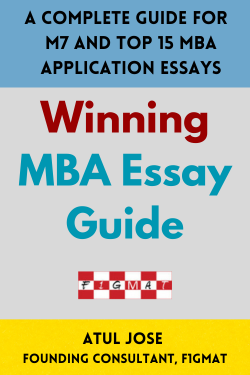Like the concept of belonging, Agency has a broad research literature that evaluates a person’s sense of self by measuring how much autonomy they feel in pursuing a goal.
In this MBA Essay Writing Tips series, I cover:
- Agency
- Tough Goals – Recent Past
- Possible Selves and MBA Goals
- Evaluation of Goals – Internal and External Motivation
- Internal Motivation
- External Motivation
- Internal Motivation and Pursuit of Goals
- Future Self and Peers
What is Agency?
Agency is brilliantly explained through the MAPS (Metacognition, Agency, Behavior and Possible Selves) model that postulates that to develop a sense of agency, one must have strong self-regulation of actions and behaviors.

I would argue that the current generation applying to M7 schools are far more capable of self-regulation if they have crossed all the academic entry criteria than an applicant who achieved similar grades a decade or two ago.
The sense of agency is not just validated by your academic achievements or any achievement that requires persistent application of skills (music, arts, sports). It also determines your ability to achieve your short-term and long-term goals.
Schools use the narrative you have used in your goals essay to validate your ambitions. That is one reason consultants like me emphasize the need to add narratives on how you achieved a tough goal in the recent past in your goals essay - not to reiterate the resume but to demonstrate your agency.
Tough Goals – Recent Past
There are universally agreed on tough achievements and milestones outside one’s academic achievements that will force the admissions team to pause.
Two years back, I read the resume of an applicant who ticked all the check boxes to be a Harvard or a Stanford MBA admit. He just needed validation from an admissions consultant that these 1% milestones are truly 1%. I just replied, “Keep doing what you are doing” and you are likely to get into Stanford or Harvard. And he got admitted to Stanford.
These are representative of only 10-15% of the application pool.
The rest are mere mortals with misses and missteps that were corrected with their superior sense of agency.
The feedback loop – “evaluation of results” is a critical aspect of course correction.
A shift in careers, majors, or switch in functions/employers – all work if the narrative has clear evidence of agency.
Possible Selves and MBA Goals
Another critical element of the MAPS model is the concept of ‘selves.’
We as human beings are wired to create possible selves right from the age of 4. The ambition to be a firefighter or a truck driver – no matter how unrealistic it was, are our young minds creating future selves.
The ‘Evaluation’ of the goals – from an interest, skills, and external factors (status, peer pressure, family), drives the sense of agency.
Evaluation of Goals – Internal and External Motivation
The ‘evaluation’ of results and goals that we are pursuing are driven by internal and external motivation.
Internal Motivation
The reason why we feel good about our childhood – apart from no pressure to earn a living or grow in a career, is the pursuit of activities that are driven by internal motivation.
Children explore activities that are motivated purely by exploration and novelty.
Through each exploration, they learn and master a skill or a concept. That is pure joy.
So when career coaches and self-proclaimed gurus preach to ‘follow’ your passion, they are indirectly asking you to find your internal motivation.
I would love to be just writing short stories everyday. But there aren’t enough movie producers, readers and publishers to help me persist with my internal motivation.
My sense of agency will be shattered if I am not rewarded for my exploration of activities that are purely based on novelty and feeling a sense of ‘joy.’
External Motivation – Welcome to the Grown-up world
The orientation to the grown-up world happens sometime in high school where pursuing learning goals becomes increasingly aligned with career goals. Even if you are planning to take over your family business or you have a clear career path to follow, your learning will be optimized to thrive as the ‘future self’ and not to pursue the exploration of current activities that gives you joy.
Internal Motivation and Pursuit of Goals
Internal motivations also play into your pursuit of tough goals – even if the goals are aligned with a career.
Here autonomy or sense of agency in completing a task or mastering a job function is influencing your internal motivation.
Even the thought of pursuing an MBA and switch careers happens when you strongly feel that you have exhausted the reserve of internal motivation to continue in the current role or career path.
Studies on external rewards (bonuses or other perks) diminishing the feeling of autonomy validate the behavior of late 20s and early 30s career switchers.
I had several career planning discussions where the client once they shed the corporate persona revealed their true motivation.
And the career paths are incredibly risky. If the person asks the same question to a corporate career planner, they will limit the search to the 3 big job markets – Finance, Consulting and Technology.
If you are choosing a goal, don’t share your internal motivation for a short-term MBA goal.
Share a goal that aligns with your experience, professional accomplishments, and the feasibility of achieving the goal with the MBA.
Admission Consultant's Tip - MBA Goals Essay
For a long-term goal, go back to the innocent times as a child where the only motivation was curiosity, identity, and mastery with reward rarely a factor in persisting with a goal.
Future Self and Peers
If you are in Technology and pursuing an MBA, it will be seen as anomaly to the pursuit of Project Managerial and Product Managerial roles that a career in technology rewards. This is true for career switchers in any industry.
Even in Business Schools, the ‘assumed’ peers based on similar industries and functions will determine your sense of agency.
That is why it is extremely challenging for an entrepreneurial MBA candidate to thrive in a business school when peers are all earning $250,000+ offers.
No one wants to stare at a $100,000 remuneration – if they are lucky (90% fail within 2 years), and 2 years of ‘survival’ money when peers are racing ahead with their career and life.
It is not just entrepreneurial candidates.
The decline of Marketing and General Management roles in M7 and T15 schools is also driven by the ‘peer’ pressure to embrace the $200,000 plus remunerations guaranteed in consulting.
When applicants feel that they have several future selves, the narrative will also read like they lack focus.
Related Download
References
- The MAPS model of self-regulation: Integrating metacognition, agency, and possible selves - Leslie D. Frazier, Bennett L. Schwartz & Janet Metcalfe
- Self-Determination Theory and the Facilitation of Intrinsic Motivation, Social Development, and Well-Being - Richard M. Ryan and Edward L. Deci, University of Rochester
 I will teach you how to bring your life stories to essays faster with F1GMAT's essay guides. Download below or subscribe to F1GMAT's Service and work with me - Atul Jose, Author/Editor/Founding Consultant, F1GMAT(16 Years of helping applicants gain admissions to M7 and Top 30 schools)
I will teach you how to bring your life stories to essays faster with F1GMAT's essay guides. Download below or subscribe to F1GMAT's Service and work with me - Atul Jose, Author/Editor/Founding Consultant, F1GMAT(16 Years of helping applicants gain admissions to M7 and Top 30 schools) 